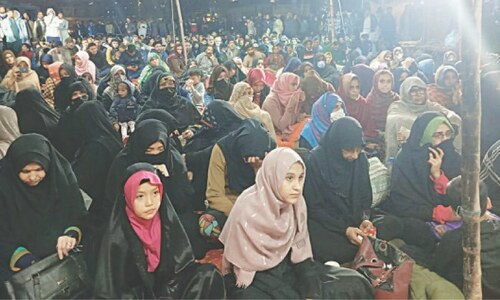HYDERABAD: At a two-day national conference titled ‘The Problems of Women and Their Solution in the Light of Teachings of Islam’ on Wednesday, scholars asked for effective legislation to address issues confronting women.
The event was organised by University of Sindh (SU) department of comparative religion and Islamic culture at Shaikh Ayaz auditorium of the faculty of arts building.
Event chief guest and keynote speaker, Council of Islamic Ideology (CII) Pakistan chairman and former University of Peshawar vice chancellor Prof Dr Qibla Ayaz in his address on ‘Early-age marriages in the light of international law’ said that in several Islamic states — including Morocco, Mauritania, Oman, Syria, Albania, Bangladesh, Algeria, Tunisia and Iraq — the average age for marriage was around 18-21 years. Pakistan had also joined those ranks by legislating 18 years as the minimum age for both men and women, he added.
“The council had deliberated the issue of appropriate marriage age for women in the greatest possible detail in its recent meetings and had come to the conclusion thereby to recommend to the government and parliament to sensitise and educate public on this issue with a view to [prepare] ground for parliamentary legislation to this effect,” he said.
He lamented the plight of women even in modern times and attributed it to a lack of education, social apathy and slow-paced implementation of relevant laws, according to a press release.
“While the world still argues about the role, rights, positioning and status of women in society, Islam accords them incredibly high regard, albeit it stresses diverse yet complementary responsibilities for both men and women to perform.
“Islam, addressing all problems a woman is supposed to encounter, provides her maximum economic, social, political and personal cover,” University of Sindh Vice Chancellor Prof Dr Fateh Mohammad Burfat said while presiding over the moot.
He cited instances from the Prophet’s (PBUH) life in which the Prophet (PBUH) accorded highest honour to his beloved daughter Bibi Fatima Zehra and to his esteemed spouse Bibi Khadijah.
“The nefarious social practices regarding women are all against the spirit of teachings of Islam. We witness happening in society, including honour killing, barter marriages, premature marriages, offering of women as penalty in tribal feuds, forced marriages, and preference of sons over daughters,” he said.
He hoped that the deliberations of the moot would hopefully lead to formulating recommendations ushering sustainable resolution of women’s problems.
Speaking as guest of honour, Research and Development Foundation head Ashfaq Ahmed Soomro bemoaned the fact that women were not treated at par in most countries around the globe despite all the proclamation to enlightenment and civil liberties.
Others who also spoke included SU’s Faculty of Islamic Studies Dean Prof Dr Hafiz Munir Ahmed Khan, department of comparative religion and Islamic culture chairman Prof Dr Bashir Ahmed Rind, Prof Dr M.K. Sangi of the SU’s Institute of English Language and Literature.
Published in Dawn, February 21st, 2019














































Dear visitor, the comments section is undergoing an overhaul and will return soon.